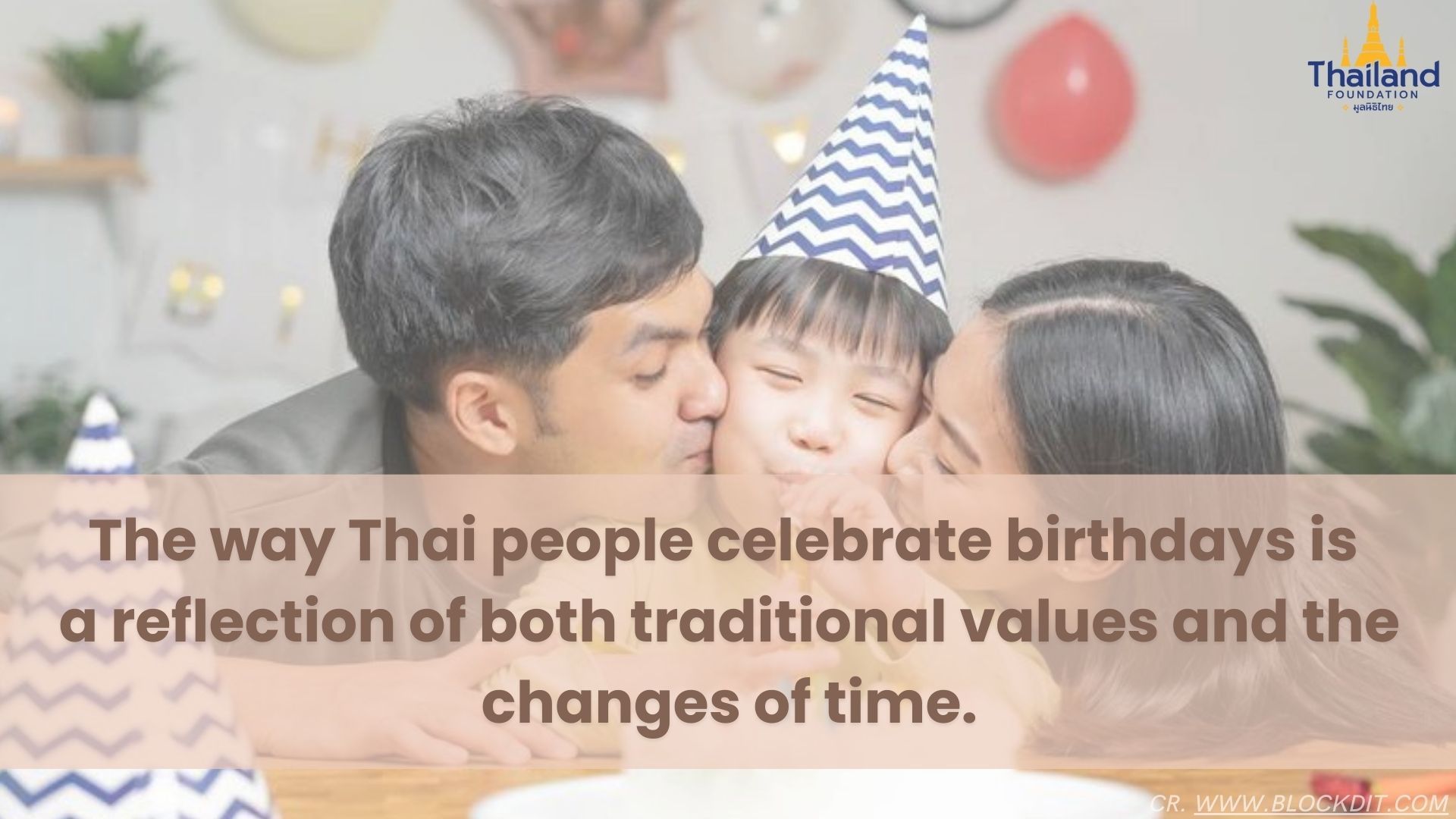
Whether a grand event or an intimate celebration, birthdays are a time of joy, where love and happiness fill the air as you reach another milestone along the road of life. Birthday celebration is a significant ritual across continents and cultures, with customs and traditions varying due to differences our beliefs. In Thailand, birthday celebrations were once considered somewhat of a taboo. Yet, today, many Thais celebrate their birthdays with great excitement. Let us find out how the beliefs around birthday were born and evolved, and what Thais people are doing today for their birthdays.
When did Thais first practice birthday celebration?
The Thai tradition does not appear to have the concept of birthday celebration as there is no documented evidence or references from ancient literature. This aligns with the Thai ancient belief in which our date of birth is a closely guarded secret, for fear that this piece of sensitive information, if leaked into the hands of our enemies, could render us vulnerable to attacks through means of black magic.
The earliest record of an official birthday celebration in Thailand happened is the Royal Birthday Ceremony of King Rama III (1824–1851). His Majesty’s Birthday Ceremony, however, did not align with his actual birthdate, but was held on the Thai New Year, or Songkran. Subsequently, the practice of celebrating birthdays according to the solar calendar, as observed today, was introduced by King Rama IV (1851-1868). During his monkhood, he dedicated himself to studying astrology until he could convert lunar birthdates to Gregorian birthdates. Birthday celebrations gradually spread from royalty to the general public, finally becoming a widely popular in the reign of King Rama IX (1946-2016).
What Thais do on their birthdays
- Birthday merit making
In Thai birthday celebrations, a significant tradition is the act of tham bun (ทำบุญ) which is literally translated to “merit making.” This involves performing good deeds that benefit society and others. Thais believe that even small acts of kindness, done with pure intentions, contribute to accumulating merit, which brings blessings to this life and the next. Typically, birthday merit-making is a private activity, except for those who hold important positions within their communities.
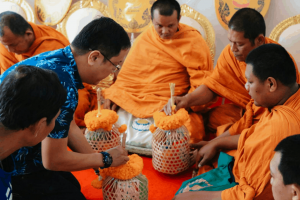 Merit making as birthday celebrations
Merit making as birthday celebrations
Cr. 3minutesfood.com
There are no set rules for birthday merit-making in Thailand. Individuals can choose how many monks they would like to offer alms to, and it is not mandatory to perform this act on the actual birthdate. Nonetheless, some interesting customs are observed. 1) Giving alms to the number of monks equal to one’s age plus one. This practice is believed to help extend one’s life for another year. For instance, a 25-year-old may give alms to 26 monks. 2) Many Buddhists prefer to make merit on their birthday every year while others opt for a more frequent rate: weekly merit making. For example, those born on Sunday often give alms to monks every Sunday.
One widely practiced merit-making activity is giving alms to Buddhist monks during their morning alms rounds. The birthday person will prepare food and wait for the monks to pass by their home, or they may choose to visit the temple to make offerings called sanghadana (สังฆทาน). Some may host a lunch and invite monks to their home to give them blessings on this special day.
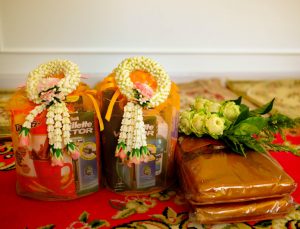
Sanghadana (สังฆทาน)
Another way to make merit is by rescuing animals that are destined for slaughter. The Thai tradition holds that by saving these animals, individuals will have a longer life. People often visit fresh markets to purchase aquatic animals, such as fish, eels and turtles, or land animals like cows and buffalo, that are going to be slaughtered for consumption.

Making merit as birthday celebration by rescuing animals
Cr. thaihealth
- Partying, candles blowing, gifting, and eating out
As Thais are more exposed to Western media and culture, we learn to adopt some beautiful aspects of birthday celebration from the other side of the world. The Western celebration is particularly popular among certain demographic groups in Thailand. We often see parents hosting parties for their toddlers’ birthdays, or teenagers and young adults dressing up for their best friend’s birthday. The working-age and urban populations are another group that looks forward to throwing joyous birthday parties for their loved ones and vice versa. The central element of these celebrations is the birthday cake, adorned with candles to be blown out after making a “birthday wish,” just like in Western birthdays.

Birthday Party
Cr. sistacafe.com
Alongside blowing out candles, other customs include unwrapping presents or cards, enjoying a special meal at a restaurant, and partaking in leisure activities such as taking a day off work, shopping, or going on a trip, and last but not least, planning birthday surprises to foster an even stronger bond, evoking feelings of warmth and gratitude, and creating lasting memories.

Cr. www.blockdit.com
- Thai-Chinese hold special celebration for their 60th birthday
Aside from celebrating normal birthdays, Thai Chinese also celebrate an especially elaborate birthday when they turn 60. “Shēngrì” (生日) is a significant rite of passage in the Chinese culture. Upon reaching the age of 60, a person is considered to have fulfilled all meaningful aspects of the human experience, having seen enough of the world to acquire a profound understanding of life. The person is thus deserving of the status of an elder within the family and community. “Saeyid” (แซยิด) is term Thai Chinese use to refer to this important transition. This ceremony is a communal affair, involving not only family members but also the broader community. For Thai Chinese who adhere to Buddhist beliefs, they may observe a vegetarian precept or stay three days in a Chinese temple before their birthday. Central to the Saeyid ceremony is the homage paid to household gods and ancestral spirits, reflecting the Chinese reverence for family unity and the longevity of elders.
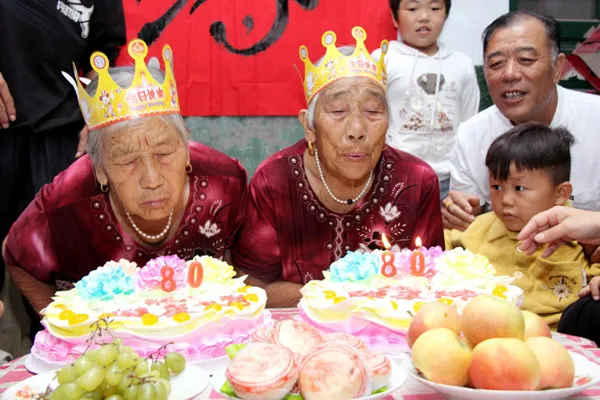
Thai-Chinese special celebration for their 60th birthday
Cr. kajaanikiina.wordpress.com
- Royal birthdays are national holidays with nationwide celebrations
In Thailand, the birthdays of the King and Queen hold significant cultural meanings. Important royal birthdays are celebrated as national holidays, including the birthdays of King Rama X on July 28 and Queen Suthida on June 3. The birthday anniversary of the late King Rama IX is observed as the National Day and National Father’s Day. Meanwhile, the birthday of Queen Sirikit, the Queen Mother on August 12 is celebrated as the National Mother’s Day. The public joins in the celebration by wearing shirts and displaying flags in the colors associated with each royal birthday. The colors come from the Hindu-Brahmin practice of assigning a color to each of the seven days, based on the color of the celestial body that governs that particular day. For example, the birthdays of King Rama IX and King Rama IX falls on a Monday, which is govern by the Moon. Thus, people wear yellow on the two Kings’ respective birthdays.
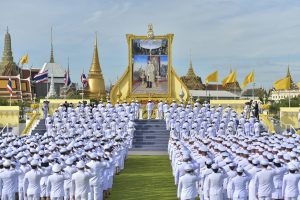
Civil servants participated in the birthday ceremony of King Rama X
Cr. thairath
How to participate in Thai birthday celebrations?
Celebrating birthdays is a global tradition, and there are plenty of ways to make your Thai friends, colleagues, bosses, or partner feel special on their big day. Sending a heartfelt birthday message via text or social media is a simple yet meaningful gesture. For your close friends, consider giving them a gift they have been eyeing or you can chip in with other friends for a bigger present. Gift certificates for dining, beauty, or wellness services are also popular choices.

If you are in a romantic relationship, get creative with a handmade card or gift with a sweet loving birthday wish, surprise flowers at their workplace, or a cozy breakfast in bed. A piece of jewelry, a spontaneous day trip, or a charity event together can also make for memorable experiences. An act of merit-making together as a couple is traditionally believed to help the couple be reunited in their next lives. Above all, the best gift is spending quality time together and showering them with love and attention on their special day.

Cr. hqluggage.com
And do not forget about your bosses or elder relatives. A polite greeting card wishing them good health and longevity, along with a thoughtful flower or gift basket, can convey your respect and love. It is common for elders or important individuals to receive baskets of flowers or gifts from people who hold them in high regards. Popular gift items for a basket includes bottled bird nest soup, fruits, food items, and assorted goods.

Cr. www.bms
What do birthday celebrations reveal about Thais?
The Thai-style birthday celebration is ultimately intertwined with the Thai people’s Buddhist beliefs. In Buddhism, the concept of birth is part of the overarching philosophy of impermanence and the cycle of life and death known as samsara (สังสารวัฏ). Birth is regarded not as a singular event but the beginning of a journey towards death. Individuals are thus encouraged to embrace the ephemeral and fragile nature of life and let go of the fear of the inevitable. This fact is irrefutable, but never easy to accept. Therefore, for Buddhists, birthday merit making holds dual significance: it serves as a reminder of our mortal life while also providing an opportunity to extend well wishes for positivity.
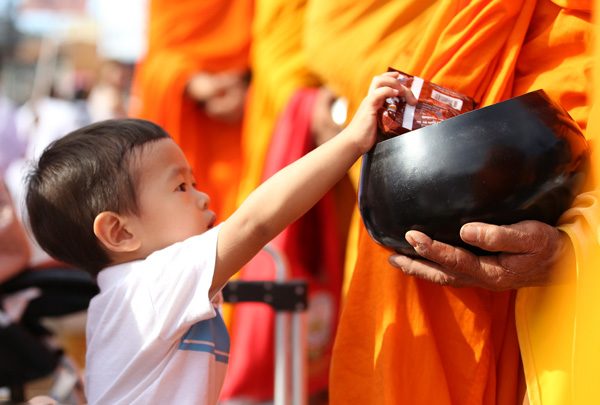
Cr. kalyanamitra
Within this context, the practice of making merit on one’s birthday represents an acknowledgment of the interconnectedness of life, and the debt of gratitude owed to one’s parents for giving the precious gift of life. It provides a unique opportunity for introspection and spiritual growth, and to cultivate virtues such as generosity, compassion, mindfulness. humility, and commitment to the path of enlightenment. In essence, this practice is not merely a ritual but a profound expression of understanding of life.
While Buddhism serves as the bedrock of Thai spirituality, the Thai people demonstrate a graceful integration of Western customs, alongside age-old rituals, proving Thailand’s vibrant and dynamic cultural landscape. Thai people, renowned for their cheerful and affectionate disposition, brighten up the somber contemplation of death and the body’s natural decay with joy from the Western perspective. This innate ability to find reasons for celebration stems from the remarkable openness to diverse cultures, allowing Thais to embrace the beauty and diversity of life at any given moment.
Conclusion
Birthdays hold a profound meaning for people across cultures. It is a yearly reminder of how lucky we are to have lived for another year. In Thailand, birthdays offer a moment for reflection, a chance to acknowledge the blessings bestowed upon us by those who are kind to us. Regardless of our individual beliefs, each birthday we reach is a precious gift, symbolizing luck, and renewal. It is an opportunity to embrace new beginnings, to cherish life’s fleeting moments, and to navigate our journey with mindfulness.
The story of the “Birthday Celebrations in Thailand” may be a part of everyday life in Thailand, but it reflects deep cultural values. The practice had gradually found its way into Thai households, blending local and foreign influences harmoniously through the Thai value of openness. Join us in exploring more stories of Thailand and the Thai people, as we take you on a journey to discover Thainess.
Sources
- https://so06.tci-thaijo.org/index.php/Vanam_434/article/view/247639/167932
- https://guru.sanook.com/12401/
Author: Soonyata Mianlamai
Editor: Tayud Mongkolrat
31 May 2024

